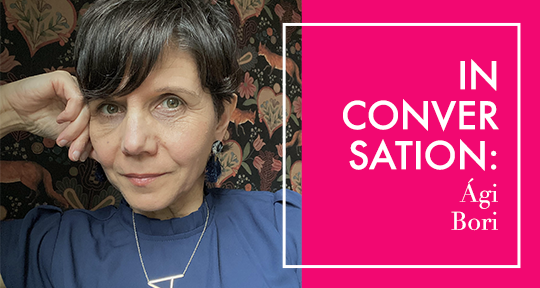A giant of contemporary Hungarian literature, Miklós Vámos melds vast existential questions with bread-and-butter concerns in his spellbinding short story, “Electric Train.” Published in Asymptote’s Winter 2024 issue, “Electric Train” approaches the traditional family drama at a slant, discarding the tropes of dramatic realism in favor of a jester-like narratorial voice that boldly announces, “In literature it is practically mandatory to see inside people’s heads,” before plunging headlong into the tattered lives of a family of four. Questions and answers rebound like so many jokes told at a party, but even as the humor attempts to efface the tragedy, what defines this story is a warm, humane glow that emanates from everywhere. Bringing years of expertise in working with Vámos, Ági Bori’s artful translation rises to the experimentalism of the story and crystalizes it into an English that is fresh, magnetic, and strange. In this interview, Ági and I discuss the art of translating a living author, the political history that subtly underpins “Electric Train,” her own circuitous path to becoming a literary translator, and much more.
Willem Marx (WM): By my count, you’ve translated over a dozen of Miklós Vámos’ stories and essays, as well as conducted interviews with him and written essays on his oeuvre. Can you describe the experience of becoming so embedded—as a translator—in the work of a single writer? Are there ways this prolonged focus on one body of work has informed your approach to translation in general?
Ági Bori (ÁB): I have had a lifelong fascination with not only Hungarian, but also translated literature in general, so it seems only natural that over the last decade, I have metamorphosed into a literary translator—perhaps one of a small number of niche translators who, like you said, is embedded in the work of a single writer. The actual moment when something awakened in me was when, shortly after having fallen in love with Miklós’s books and writing style (particularly his unending gallows humor), I wanted to share this experience with my literary friends and discovered that only one of his books, The Book of Fathers, had been translated into English. I sensed that I was at an unprecedented crossroads in my life—and it turns out that I was. I reached out to Miklós and asked him if I could translate an excerpt, and he agreed. I still vividly remember choosing that excerpt, taking a deep breath, and saying to myself—perhaps somewhat naively—that it was time to listen to my inner voice, no matter how intimidating the craft of translating seemed. From that day on, I just kept going and never stopped. As my translation skills blossomed, so did our professional relationship, and it soon became clear that Miklós had an endless supply of materials I could work on, not to mention that as time went by, I became very comfortable with his writing style—by now it feels like a second skin. We work together like a well-oiled machine, one that runs on very little sleep and frequent communication via our transcontinental subway.
This prolonged focus on one body of work has certainly been a rewarding experience. It taught me how important it is to seek out the work you want to translate, and how immensely helpful it is mentally—and even emotionally—when you love the original text that you are about to render into your target language. I feel fortunate to have embarked on a writer’s work with which I was able to connect from the start. Lucky for me, Miklós’s writing style varies greatly within his oeuvre, including stream of consciousness and classic prose. At times I feel like a kid in a candy store. READ MORE…

